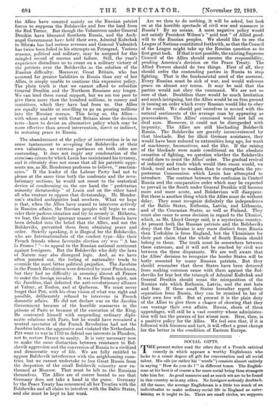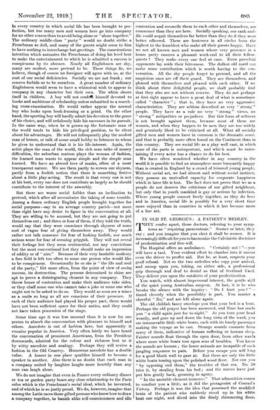SOCIAL GIFTS.
THE present writer read the other day of a French satirical comedy in which appears a worthy Englishman who lacks to a comic degree all gift for conversation and all social talent. His role (or rather his "words ") consists almost entirely in saying " How do you do ? " in different tones. The English. man at his best is of course a far more social being than strangers take him for. As good manners and as much wit are to be found in this country as in any other. No foreigner seriously doubts it. All the same, the average Englishman is a little too much of an individualist to make ordinary social life in England as entertaining as it ought to be. There are small circles, we suppose,
in every country in which social life has been brought to perfection, but too many men and women here go into company for no other reason than to avoid being alone or "alone together." The ordinary middle-class " party " would no doubt strike a Frenchman as dull, and many of the guests might seem to him to have nothing to interchange but greetings. The conscientious intention which animates the Frenchman of doing his level best to make the entertainment to which he is admitted a success is conspicuous by its absence. Nearly all Englishmen are shy, many are modest, more pretend to be. These things lie, we believe, though of course no foreigner will agree with us, at the root of our social deficiencies. Socially we are not frank ; our reserve forbids us to be ourselves. A great number of ordinary Englishmen would seem to have a whimsical wish to appear in company in any character but their own. The whim shows itself in children. A boy will not confell§ himself devoted to books and ambitious of scholarship unless submitted to a searching cross-examination. He would rather appear the normal boy who looks upon book-learning as a grind. On the other hand, the sporting boy will hardly admit his devotion to the game of his choice, and will sedulously hide his successes in its pursuit. In the same way, when he is grown-up the fortunate man of the world tends to hide his privileged position, to be silent about his advantages. He will not infrequently play the modest man of letters, or talk of some small hobby to listeners to whom he gives to understand that it is his life-interest. Again, the artist plays the man of the world, the rich man talks of money difficulties, the suburban matron plays the woman of fashion, the learned man wants to appear simple and the simple man learned. We have an absurd love of masks, often of a most transparent nature. We use them partly to screen our shyness, partly from a foolish notion that there is something festive about a little play-acting. The result is that every one is not at his best, every one does not contribute as largely as he should contribute to the interest of the assembly.
But there are worse social foibles than an inclination to pretend, which after all necessitates the taking of some trouble. Among a dozen ordinary English people brought together for social purposes—say in an average country parish—not more than eight have any desire to figure in the conversation at all. They are willing to be amused, but they are not going to put themselves out ; and three or four of them, if they told the truth, would say that they were conscious through shyness of some sort of vague fear of giving themselves away. They would rather not talk nonsense for fear of looking foolish, nor much serious sense for fear of seeming priggish. They will not reveal their feelings lest they seem sentimental, nor any convictions but the most conventional lest they should make an impression of oddity or of " airs." Because of their very laudable modesty a free field is left too often to some one person who would like to be conspicuous. Occasionally he or she is " the life and soul of the party," but more often, from the point of view of social success, its destruction. The persons determined to shine are apt to prove a disintegrating element in any company. They throw bones of contention and make their audience take sides, or they chaff some one who cannot take a joke or some one who ought not to be asked to do so. They would as soon see a wince as a smile so long as all are conscious of their presence. If each of their audience had played his proper part, there would have not been sufficient space for their antics, and they could not have taken possession of the stage.
Some time ago it was less unusual than it is now for one person to absorb the conversation with pleasure to himself and others. Anecdote is out of fashion here, but apparently it remains popular in America. Very often lately we have heard the conversation of prominent Americans, from the President downwards, admired for the colour and richness lent to it by witty anecdote and analogy. Perhaps they will revive a fashion in the Old Country. Humorous anecdote has a double value. A hearer in one place qualifies himself to become a speaker in another. Also there is no doubt that each man in a company united by laughter laughs more heartily than any man can laugh alone.
We do not imagine that even in France every ordinary dinner or tea or garden party bears any close relationship to the Paris salon which is the Frenchman's social ideal, which he invented, and of which he is so justly proud. We do, however, imagine that among the Latin races those gifted persons who know how to draw a company together, to banish alike self-consciousness and idle
contention and reconcile them to each other and themselves, are commoner than they are here. Socially speaking, our rank-andfile could acquit themselves far better than they do if they were better officered. There are hostesses in all circles from the highest to the humblest who make all their guests happy. Have we not all known men and women whose very presence in a house party ensures a pleasant week-end to all their fellowguests ? They make every one feel at ease. Even parochial opponents lay aside their bitterness. The dullest old maid can make some contribution which is worth having to the conversation. All the shy people forget to pretend, and all the suspicious ones are off their guard. They are themselves, and pleased with themselves and pleased with each other. If we think about these delightful people, we shall probably find that they also are not without reserve. They do not perhaps at first sight appear to have a great deal of what is sometimes called " character " ; that is, they have no very aggressive characteristics. They are seldom described as very " strong " people. They have as a rule no very " strong " views, no " strong " antipathies or prejudices. But this form of softness is not brought against them, because most of them are women, and when they happen to be men they are too widely and genuinely liked to be criticized at all. What all socially gifted men and women have in common is the dramatic sense, and that is probably more often found on the Continent than in this country. They see social life as a play well cast, in which none of the parts is unimportant, and whit h must be entertaining if every actor has a chance to do his best.
We have often wondered whether in any country in the world it is possible to find an atmosphere more buoyantly happy than is created in England by a crowd of leisured young people. Without social art, we had almost said without social instinct, they possess an unrivalled capacity for corporate happiness which in later life is lost. The fact does not prove that we as a people do not deserve the criticisms of our gifted neighbour, but only that in youth mankind is gay or serious by infection. Where young people consort freely together, as they do here and in America, social life is possibly for a very short time more enjoyed than in countries in which it has become more of a fine art.







































 Previous page
Previous page